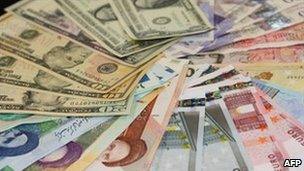Currency wars threaten global economic recovery
- Published

Currency manipulation is worsening global economic imbalances
Manipulating their currencies has become governments' new weapon in the battle for economic recovery.
In recent months a string of countries, from Japan to Switzerland, Colombia to Israel, have tried to drive down the value of their currencies.
Some experts call it "competitive devaluation".
Others, though, argue that it is nothing short of a currency war - and far from boosting global recovery, it threatens to undermine it.
So concerned are policymakers that the issue looks set to dominate talks on Friday at a meeting of finance ministers and central bankers.
Dominique Strauss-Kahn, managing director of the International Monetary Fund (IMF), which hosts the meeting in Washington, set out the concerns in the Financial Times on Tuesday.
"There is clearly the idea beginning to circulate that currencies can be used as a policy weapon.
"Translated into action, such an idea would represent a very serious risk to the global recovery," he said.
Yen action
Last month, the Bank of Japan began a massive sale of yen and bought dollars instead.
The aim was to weaken the yen's value against the dollar and so make goods exported by such firms as Honda and Panasonic cheaper.
It also helps boost companies' profits when they convert foreign earnings back into yen (although this conversion adds to the upward pressure on the yen's value).
Japan's ailing economy is dependent upon an export-led recovery, and when the yen hit a 15-year high against the dollar Tokyo, felt it had to act.
But currency intervention does not happen in isolation. (And as the chart below shows, the yen is broadly back to where it was before the intervention).
Japan's action led to a rise in the dollar's value - a problem for the US's own export-led recovery.
America is in dispute with China, with Washington accusing Beijing of dampening the yuan's value and making US exports more expensive.
Any rise in the dollar, caused by Japan's intervention, magnifies US exporters' gripes with Beijing.
Tit-for-tat
Unilateral action by one central bank can, therefore, set off or fuel disputes in other parts of the world.
In this game of three-dimensional chess, countries are forced into tit-for-tat action.
On 27 September, Brazil's finance minister Guido Mantega warned that the "international currency war... threatens us because it takes away our competitiveness". Brazil would not stand idly by, he said.
And, so, the cycle of currency intervention threatens to continue.
For Charles Dallara, head of the Institute of International Finance, which represents the world's big banks, the issue risks setting off a new round of protectionism.
In a letter to the IMF, he urges the world's leading economies to get a grip on the problem.
"Addressing exchange rate issues should also be a key priority for multilateral negotiations among a core group of major economies," Mr Dallara wrote.
But the major economies seem in no mood for compromise.
The US said this week that the IMF "has a very important role to play" in trying to get a multilateral cooperation on currency intervention.
Yet US Treasury Secretary Timothy Geithner has vowed to enlist other G20 nations to pressure China to let its currency rise.
He appears to have support in Europe. Jean-Claude Juncker, chairman of the eurozone group of finance ministers, said: "China's real effective exchange rate remains undervalued... The Chinese authorities do not share our view."
In return, comments from policymakers in Beijing suggest China is irritated at foreign interference in what it regards as an internal matter.
Hot money
Although America sees itself as a victim of global currency intervention, many people argue that its own policies are the cause.
The governor of Taiwan's central bank, Perng Fai-Nan, said last month: "The US printed a lot of money, so there's a lot of hot money flowing around. We see hot money in Taiwan and elsewhere in Asia.
"These short-term capital flows are disturbing emerging economies," he said.
Joseph Stiglitz, the Nobel economics laureate, agrees: "The irony is that the [Federal Reserve] created all this liquidity... It's doing nothing for the American economy, but it's causing chaos over the rest of the world."
Whether or not the US started the problem, most observers believe it has the lead role in trying to resolve it.
Dr Paola Subacchi, research director for international economics at Chatham House, in London, said: "Rather than China-bashing, the US should lead efforts to co-ordinate exchange rate policies and put the issue on the global agenda... The US sets the pace on currency issues."
But a resolution will not happen overnight, and certainly not at this week's IMF meeting. What's more, the problem is likely to get worse before it gets better.